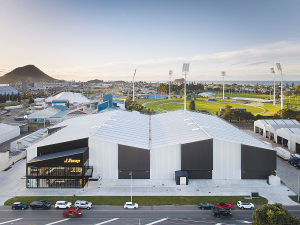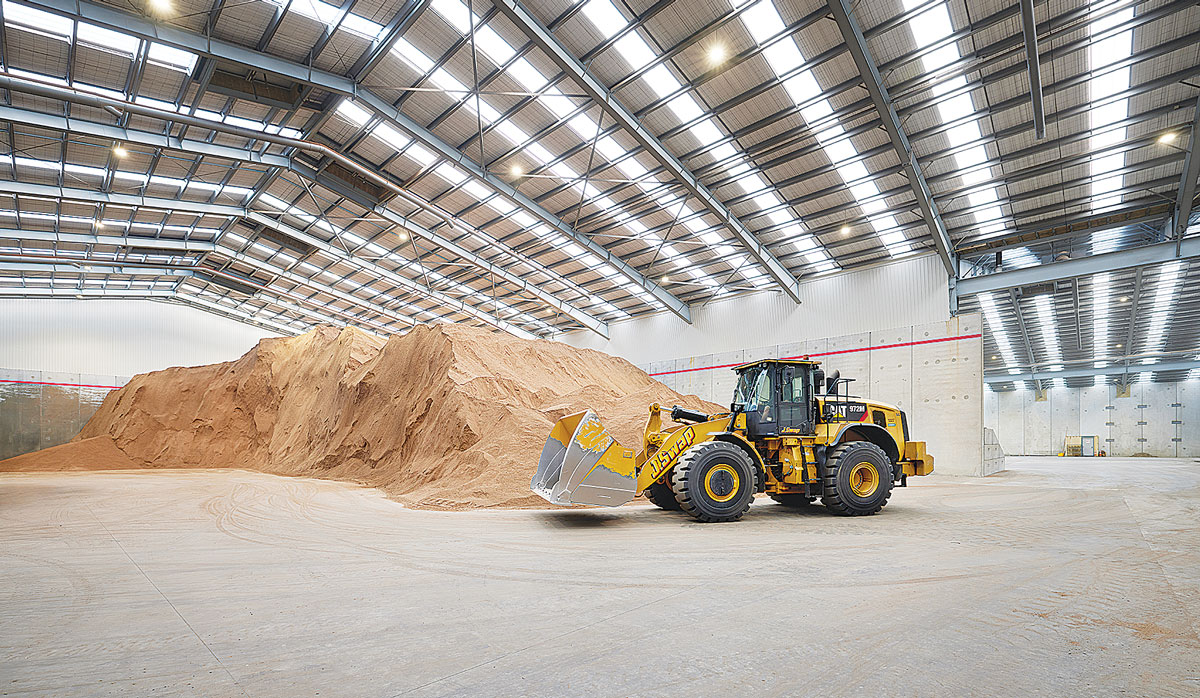Feed supply tight as focus turns to mating
OPINION: As the season progresses, attention on farm is now turning to mating.
 J Swap says its new purpose-built warehouse is designed from the ground up specifically to meet more stringent air quality standards.
J Swap says its new purpose-built warehouse is designed from the ground up specifically to meet more stringent air quality standards.
Productive industries shouldn’t be strangled in red tape, they need to be able to operate and grow, using technology to meet rising expectations for environmental standards, according to Dudley Clemens – environmental manager at J Swap Ltd.
The Matamata-based company has put this into action, investing in a cutting edge, purposebuilt stockfood storage facility at Mount Maunganui, next to the Port of Tauranga, which more than meets emissions targets. In 2018 the regional council changed the airshed rules, including for the port, and the area was declared “polluted”. For particulates, logs were deemed as the number one contributor and bulk freight was number two, although collectively ‘Industrial’ contributes just 18% of the local pollution, with Marine, Transport, and Traffic (Tauranga’s population is now about 140,000) contributing most of the balance.
At ‘the Mount’, the long-established port and adjacent industrial strip have acquired new neighbours over the years as the residential area has expanded. Perhaps not surprisingly, it is industry that is now expected to change.
Clemens says J Swap is doing their bit. As with farming though, the tighter restrictions must be applied with enough common sense to allow the productive sectors to operate and to grow.
“Some groups want us to move, but the solution to pollution is not shutting us all down, the solution is enabling us all to apply new technology and methods to fix problems. Some tolerance is needed.
“We’re trying to be leaders in this space so we can meet our obligations while still being able to grow.
“The new rules are very strict, and represent quite a step up for everyone involved. So, the challenge for industry in the area was to modify operations to reduce emissions, in line with the revised regulations.”
Swap Stockfoods have two bulk storage warehouses next to the port: the old warehouse, built in 2013 years before the air quality rules changed, has ‘grandfather rights’ that allow it to operate under the old rules for 3 years, after which the company will need to apply for new consents for the building.
The huge new warehouse on Hull Road, Mount Maunganui, is purpose-built with new emissions technology that not only meets but exceeds the new rules and emissions standards. Clemens says it is considered in the industry as one of the best of its kind in the country.
A lot of thought and expertise went into the planning. For example, the transition zone – where trucks enter and exit the building – is set further back from the road; the building is completely sealed; the pneumatically- operated door for heavy trucks is open for 30 seconds per pass, limiting the time the building is open; a ‘sweep zone’ where the trucks first come inside is sectioned off from the storage area and kept clean, to reduce the potential for dust build up to exit through the door.
“The ducting and extraction system is also cutting edge,” says Clemens.
“We’ve created a zone of negative pressure to draw air (and dust) away from the door area. We can shut off extraction in areas within the building – using pneumatic gates on the ducting – depending on which areas we’re loading or unloading product.
 |
|---|
|
The new warehouse is sealed and features an advanced air ducting and filtering system. |
“It is always on, and we have full control: zone control and speed control (extraction fan speed). We have also changed procedures inside the building to limit how much dust is created, even before extraction is needed.”
Following the ducting system through the wall, we come to a huge unit outside the building – the ‘bag house’, which is effectively a big vacuum cleaner, filtering out particulates using self-cleaning filters, cleaned by air ‘pulsing’, so the air that leaves the sealed system via the stack is effectively cleaned.
It is basically the same system used for fertiliser and coal applications, but this was the first time engineers had applied the technology to a stockfood warehouse.
Because it was a first, some experimentation was required to fine-tune the system. The emissions targets Swaps set themselves were set in consultation with experts in the field, and are aligned with the National Environmental Standards for Air Quality (NESAQ).
“We’ve over-engineered this to ensure we’re future proofed,” says Clemens.
'Not This Year'
J Swap director Stephen Swap says Swap Stockfoods won’t be at National Fieldays this year, and believes the event would deliver better value if it was held every other year, not annually.
Most major ag-shows around the world run in alternate years. The current slow economy, particular the rural economy, has put the focus on value – something Swap says an annual event at Mystery Creek no longer delivers.
“We still like the Fieldays and will go back, but it’s not necessary to have it every year. The costs are too high and the returns too low. Every other year would be better.”
It seems some other businesses are thinking along similar lines, with a few regular Fieldays exhibitors noticeably absent this year, although the overall exhibitor list remains solid. The disruption of the Covid years broke the spell for many exhibitors, who realised the sky didn’t fall when they were unable to go to Fieldays.
On the issue of RMA and compliance hurdles facing industry, Swap says the cost and time delays are holding the country back. He says changes are urgently needed and the new Government has at least signalled that changes are coming.
Changed logos on shirts otherwise it will be business as usual when Fonterra’s consumer and related businesses are expected to change hands next month.
Reflecting on the past year, Horticulture New Zealand chief executive Kate Scott says there has been a lot to celebrate.
Ministry for Primary Industries (MPI) Director General Ray Smith is giving a big shout-out to the horticulture sector, especially kiwifruit.
Early forecasts for New Zealand's apples and pears point to a standout season marked by exceptional fruit quality and high pack-out rates.
Tickets are now available for Beef + Lamb New Zealand’s (B+LNZ) Out the Gate, returning from 19-21 May 2026 at Te Pae, Christchurch.
Dairy Women's Network (DWN) is welcoming AgriHealth as a new partner.
OPINION: Fonterra may be on the verge of selling its consumer business in New Zealand, but the co-operative is not…
OPINION: What does the birth rate in China have to do with stock trading? Just ask a2 Milk Company.